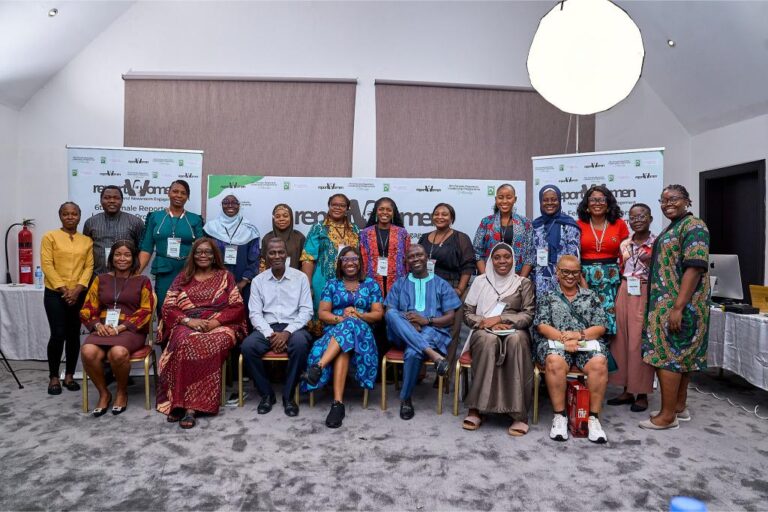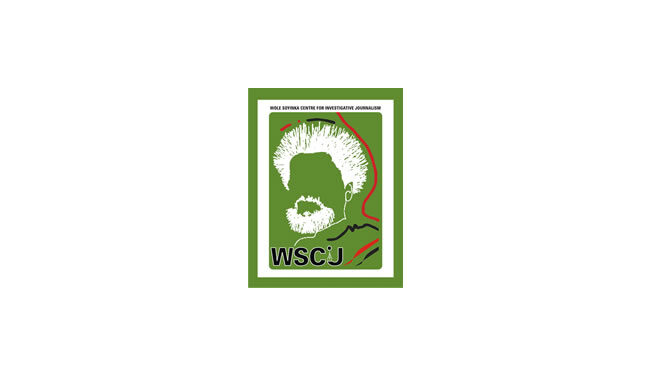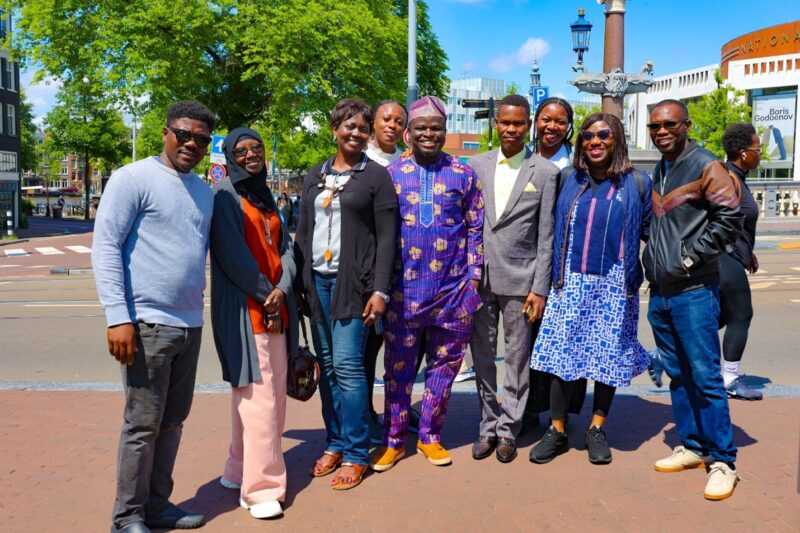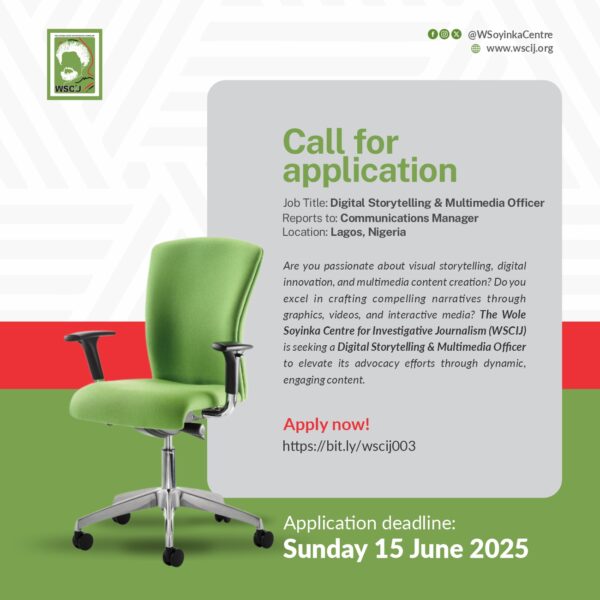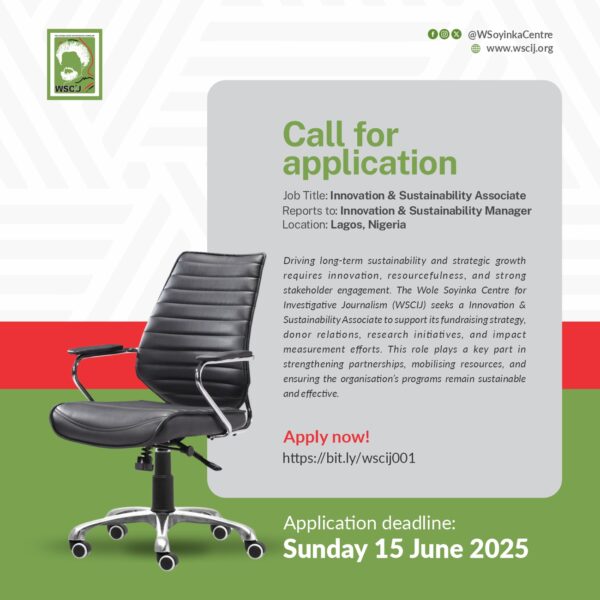The Wole Soyinka Centre for Investigative Journalism (WSCIJ) started the Sixth Report Women! Female Reporters Leadership Programme (FRLP) Fellowship with a three-day residential training in Lagos, from Wednesday 2 to Friday 4 April 2025. The training commences a six-month fellowship designed to equip the previously announced 12 selected female reporters with the skills and mentorship to improve on their accountability journalism and leadership.
The resource persons – Stella Din-Jacob, Editor-in-Chief and Director of News, TVC News; Idris Akinbajo, Managing Editor, Premium Times; Ayodele Atsenuwa, Professor of Law, University of Lagos; Bimbo Oloyede, veteran broadcaster; Juliana Francis, Publisher, Security News Alert; and Motunrayo Alaka, Executive Director/CEO, WSCIJ, took sessions on investigative reporting, leadership, newsroom management, history, laws, and policies on gender, public speaking, writing, women-sensitive, ethics and safety.
In her opening session ‘Who leads the newsroom? Why does it matter? The Report Women journey’, Alaka, shared from WSCIJ’s Report Women journey with highlights from published reports beginning from 2014. One of the reports, ‘Who leads the newsrooms and news?’, a 2024 report, shows that women hold a quarter of leadership positions in Nigerian newsrooms and news. She made a case for the natural, ethical, democratic, legal, editorial, and economic justifications for news media organisations to intentionally change this narrative.
Akinbajo facilitated sessions on investigative reporting and safety. He emphasised the need for research, storytelling and reports that expose corruption and other wrongdoings in public interest. He shared guidance on how to develop a strong pitch for an investigative report. On safety, he said, “Journalists face different kinds of risks – physical attacks, digital surveillance, and mental stress. You must stay alert, prepare before each assignment and take safety seriously at every stage of the reporting process”.
On her part, Din-Jacob addressed the essentials of building the confidence and competence needed in newsroom leadership. Her sessions also covered key areas such as clear writing, editorial judgment, strategic thinking, digital literacy, accountability, teamwork, handling stereotypes and people management. According to her, strengthening these areas is essential to challenging stereotypes both within and outside the newsroom.
“Leadership in the newsroom is not just about what you say, but how you say it,” Oloyede told the participants during her session on communication and presentation. She walked them through practical steps to improve clarity, engage the audience and speak with intent. She also spoke on the importance of body language, voice control and the use of storytelling to convey messages.
Highlighting the nuances of gender-based violence, Francis advised journalists to report with accuracy, show sensitivity to survivors and challenge cultural norms that enable abuse. She stressed the importance of avoiding sensationalism, using non-judgmental language and checking for biases in reporting. Francis warned the reporters against plagiarism.
Atsenuwa offered theoretical and backgrounding to anchor the participants’ depth in the history and law on gender studies globally and locally. She identified the limitations of society and laws on gender inequality. She noted that while human rights address many issues, they often fail to account for the unique vulnerabilities women face due to their gender. She urged the participants to continue highlighting the gaps and collaborate with policymakers to ensure enforcement of women’s rights as human rights.
In her other sessions, Alaka spoke to the Report Until Something Happens (RUSH) local, collaborative and technology driven strategy, she developed about 15 years ago. She emphasised the importance of follow-up, accountability reporting, sustained multi-stakeholder engagement, adaptation of story to other media forms like films and songs, and the use of digital platforms for social interactions and technology to keep the story relevant and compel authorities to act. To navigate work-life effectiveness, Alaka suggested that well-structured schedule and reliable support system enhance professional excellence without compromising personal well-being.”
The training also featured four fellows – Sarah Ayeku, Head of Investigations at TVC News; Goodness Adaoyiche, News Editor at TheCable; Magdalene Michael, Communications Strategist, World Food Programme; and Juliana Francis, Publisher, Security News Alert, share how the fellowship reshaped their career trajectories and equipped them to take leadership roles as individuals and in their organisations. On their part, the participants expressed commitment to apply the skills and knowledge gained from the training to improve their investigative reporting, lead with confidence and write nuanced reports that include voices of women as leaders of the news.
For over a decade, WSCIJ through the Report Women! Programme has contributed to global efforts to improve the accountability of the news media to its responsibility of representational news coverage that enhances the equity that makes democracy thrive. The Report Women! initiative has trained 549 journalists, inducted 86 fellows, supported 136 stories and 138 leadership projects, produced six documentaries and seven research reports, and engaged tens of newsrooms.
Since 2021, the WSCIJ has enjoyed partnership with the Gates Foundation as part of the Report Women: Newsroom and News Engagement programme. Dicken Olewe, Programme Officer with the foundation was part of the opening session to give a remark. His address spoke to participants he said, “This is not merely another certificate to hang on the wall, it is a rare opportunity for growth — a call to refine how we tell stories, particularly those about women, in ways that are innovative, impactful, and truly meaningful.”
During the training, participants discussed their investigative stories and leadership projects which are compulsory requirements to become Report Women Fellows. The mentors – Din-Jacob, Akinbajo, Francis and Alaka, who will coach them to deliver the projects over the next three months, provided inputs to improve each participant’s proposed ideas. The current cohort’s activities will also include a two-day accountability share-fair, follow-up training, and an award and induction ceremony to integrate successful participants into the Report Women! fellowship network.
Signed,
WSCIJ Team

